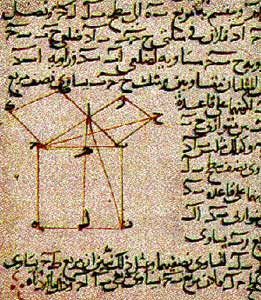Margaret likes fresh cut flowers and hexagons. She carries a metal compass, a pressed yellow carnation, and a plastic protractor in her purse. Margaret used to be Mrs. Gordon to the adolescent youth of John Adams Junior High on Sycamore Street.
Now Margaret spends her days under a shady oak in her apartment complex courtyard, watching squirrels and blue jays fight over sunflower seeds and cracked corn. She thinks about triangle congruences and bisecting obtuse angles, but rarely speaks of it. She’s sick of the condescending way the young look at the old, nodding like they care.
Margaret’s son and granddaughters bring her puzzle books and number games, try to convince her to sell her copy of Euclid’s Elements on eBay. Margaret isn’t sure what eBbay is, but she bought a steel safe and a pad lock to protect her misunderstood treasures from it. Fifteen years after retirement, Margaret still dreams in geometry.
Young people pass by, but they don’t stop. She wants to scream: Remember the postulates! Recite them. Live by them.
Margaret stares at the hybrid pink roses blooming in full sun, clutches her purse in her lap.
*
On Saturday, Margaret’s son Harry came to visit. He brought bags of groceries and a pile of magazines. Margaret had no interest in month-old Newsweeks, but she didn’t mention it. She smiled at him when he kissed her forehead.
“Shall we go to the park today?” he asked.
“I want a chalkboard,” Margaret said.
Harry stacked cans of Campbell’s chicken noodle in the cupboard. He stopped and sighed. “A chalkboard? What on earth for?”
“What does it matter? It’s a simple request.”
Harry finished with the soup and folded the brown paper bag against his chest.
“You haven’t even touched the cryptogram book I brought you.”
“I don’t like puzzles. I did not ask for a puzzle book.”
Harry disappeared into Margaret’s bedroom. She heard him stripping the sheets. Harry was an electrical engineer, worked for a computer company designing something called a chip. Margaret wanted to understand his work, but he always glossed over the details. She worried Harry wasn’t engaged in his profession.
Harry was divorced; Margaret saw his daughters more than he did. She worried about that too, but they were good girls. They brought Margaret wide-ruled paper and pencils.
Sophie was twenty and studying psychology at the University. She despised mathematics, but could sit for hours listening to Margaret talk about it, smiling.
Lucy was sixteen and painted abstract geometrics with neon acrylics; she liked to talk, philosophically, about spatial representation and higher dimensionality. Margaret didn’t begrudge their interests, but she longed for a young person in her life that could prove the Pythagorean Theorem.
Harry reappeared in the living room holding Margaret’s navy cardigan.
“Let’s go to the park,” he said.
“I’m not wearing that darn sweater. It’s still summer.”
*
On Monday, Margaret’s ribs started to ache and she developed a hacking cough. She gripped the side of the bed as she stood, felt a whirring sensation in her ears; she shifted her weight with her hip as white flashes blurred her peripheral vision. She steadied herself against the wall, sliding towards the bathroom.
She didn’t feel like eating, dressing, even breathing required too much effort. She stayed in her housecoat and sat on the couch in the living room with the curtains drawn. When she grew tired, she closed her eyes.
*
Margaret stood at the front of the class. Eager young faces wearing white cotton shirts, pressed and clean, smiled up at her. Matthew Wolfe raised his hand with such vigor he had to grasp the desk to keep it steady.
Margaret handed Matthew the chalk and stepped aside.
Matthew stood at the board and drew a perfect free-hand circle, then an inscribed right triangle. As he labeled angles and sides, Margaret sat down in a child-size desk and began to weep.
The children gathered around and comforted her.
“It’s okay, Mrs. Gordon,” they said. “We love geometry.”
Margaret looked up at a wide-eyed Suzie Patterson, blond hair pulled back tight into two symmetric pig tails, and said, “I know you do, child. I know.”
*
Margaret woke up in a white, cold room. It felt like a hospital at first, but there were no doctors, no nurses, no machines. She sat in a gold wing back chair; a bouquet of gladiolas and irises rose out of a crystal vase on a white tile counter.
Margaret blinked her eyes and Harry appeared, carrying a large chalkboard on an easel. He placed it next to the flowers, then he was gone.
Margaret rubbed her hands together, heard muffled voices.
“Read to her,” a faint young voice said.
Margaret wished for chalk and Sophie appeared, handed her a yellow stick. Margaret broke it into two pieces, as was her daily practice for thirty years, walked to the chalkboard.
“Definition Number One,” the distant voice said. “A point is that which has no part.”
Margaret drew a solid disk on the chalkboard and smiled.
“Definition Number Two. A line is breadthless length.”
Margaret drew a line. Her spine straightened; her fingers tingled with purpose.
Margaret squinted and saw yellow. Big yellow sunflowers.
Her sister Josephine was running fast up ahead, her school books slung over her shoulder in a cotton sack.
“Try to catch me,” Josephine yelled. “Run Maggie, run, run…”
Margaret jumped up the curb and onto the sidewalk, dropped her books, and ran as fast as she could. But Josephine did not slow down. She was older and stronger and so competitive.
The faint female voice began again.
“Postulate Number One. A straight line segment can be drawn by joining any two points.”
Margaret stepped back to the chalkboard.
“Postulate Number Two. A straight line segment can be extended indefinitely in a straight line.”
Margaret placed the chalk on the board and extended her line segment.
Indefinitely.



 The core workshop of SmokeLong Fitness is all in writing, so you can take part from anywhere at anytime. We are excited about creating a supportive, consistent and structured environment for flash writers to work on their craft in a community. We are thrilled and proud to say that our workshop participants have won, placed, or been listed in every major flash competition. Community works.
The core workshop of SmokeLong Fitness is all in writing, so you can take part from anywhere at anytime. We are excited about creating a supportive, consistent and structured environment for flash writers to work on their craft in a community. We are thrilled and proud to say that our workshop participants have won, placed, or been listed in every major flash competition. Community works.